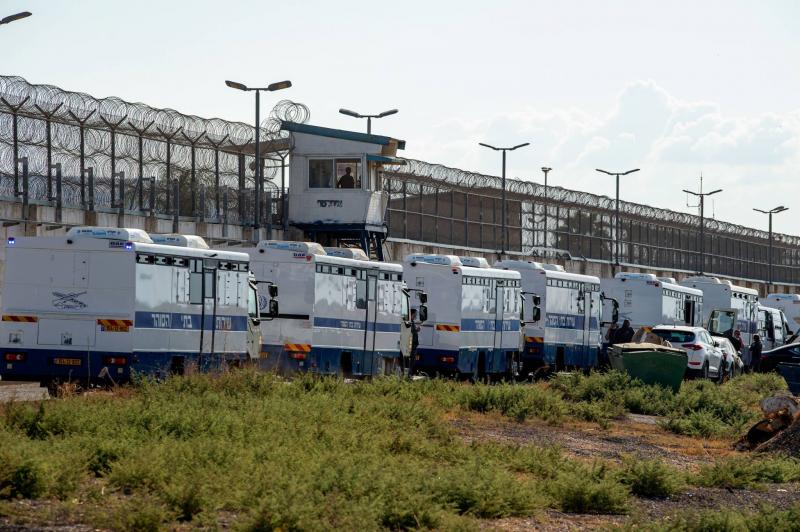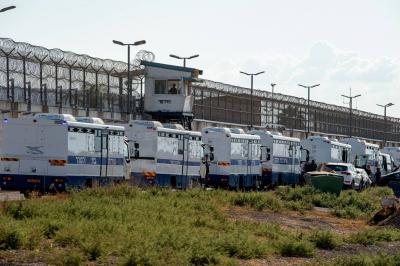"Allahu Akbar" chants rose around Ofer Prison as large buses transported 39 Palestinian women and children from Israeli detention centers, fulfilling the commitments of the first day of the agreement. The buses moved under tight security, with glass barriers preventing any victory signs. Israeli forces deliberately threw tear gas outside the prison, enforcing heavy darkness to prevent any photo opportunity that could later be claimed as a victory for the Palestinian resistance. There was chaos near the prison, where ambulances transported several Palestinians injured by gunfire. Fireworks erupted in celebration of the release of Palestinian prisoners, despite Israeli forces using tear gas to disperse the prisoners' families.
The buses transporting the released Palestinian prisoners arrived in the municipality of Beitunia in the West Bank as part of the exchange deal with Israel. Celebrations were organized, and fireworks were launched despite the Israeli forces tightening restrictions against any celebratory displays and preventing well-wishers from gathering for fear of re-arrest.
Ofer Prison is an Israeli facility operated by the Israeli Prison Service located on the lands of Beitunia, west of the city of Ramallah in the West Bank. It includes a military court and a detention center for Palestinian security prisoners. It houses prisoners from all Palestinian factions and was established during the British mandate, later turning into the Ofer detention center by the Israeli army in 1988 following the first Intifada. It closed in 1995 after the Oslo Accords and was reopened during the second Intifada. In 2006, its administration was transferred to the Shabak, and during this period, tents were replaced with solid iron and concrete walls. Ofer Prison consists of 16 sections, with each section containing a series of rooms ranging from 12 to 20, accommodating 5-8 individuals per room. Ofer is notably the only prison with a section for young detainees (underage prisoners), which is Section 13. In January 2003, two prisoners escaped security after cutting through the prison fence, and they were not recaptured. On May 12, 2003, four inmates escaped by digging a tunnel under the prison’s surrounding walls, one was recaptured while the others fled towards Ramallah, with the Islamic Jihad movement in Palestine announcing their safe arrival and protection.
Four vehicles belonging to the Red Cross departed from the depths of the Gaza Strip towards the Rafah crossing, transporting 24 civilians (13 Israelis, 10 Thais, and one Filipino), who were transferred there to the Kerem Shalom crossing via helicopters. The Thai and Filipino agricultural workers from southern Israel were among approximately 240 hostages taken by Palestinian militants during the attack on October 7. Thai Prime Minister Srettha Thavisin tweeted that 12 Thai workers were released, a number higher by two than what the Qatari officials disclosed, though the reason for the discrepancy remains unclear.
A Red Cross spokesperson confirmed that 24 hostages were transported out of Gaza and handed over to Egyptian authorities at the Rafah crossing. Eight staff members from the International Committee of the Red Cross accompanied them in a convoy of four vehicles. Fabrizio Carboni, the Regional Director of the ICRC in the Middle East, stated, “Words cannot describe the deep pain families feel over being separated from their loved ones. We feel relieved for some individuals who have been reunited with their families after a long ordeal.” Additional details were not provided, but the ICRC stated that the operation also includes delivering much-needed aid to Gaza.
A spokesman for the Qatari Foreign Ministry stated on Friday that the International Red Cross received 24 civilians who had been held in the Gaza Strip. Majid Al-Ansari said in a post on X that a number of Thai nationals were released outside the ceasefire agreement between Israel and Hamas, and they were on their way out of Gaza with the Red Cross. The Qatari Foreign Ministry confirmed via the "X" platform the release of 39 women and children Palestinians held in Israeli prisons as part of the commitments of the first day of the agreement.
Israeli Security Source stated that security agencies received 13 Israeli detainees released by Hamas in Gaza, who left the Rafah crossing to the Kerem Shalom crossing on the first day of a four-day truce between Israel and Hamas after weeks of war. In a joint statement, the Shabak and the Israeli army announced that the released hostages arrived in Israel, and their identities were confirmed. The statement indicated that “the released hostages underwent a preliminary medical assessment inside Israel. Israeli soldiers will continue to accompany them as they are transferred to hospitals in Israel, where they will be reunited with their families.”
Israel released the names of the hostages freed from Gaza today. It is expected that at least 50 out of about 240 Israelis and foreigners kidnapped by Hamas during the October 7 attack will be released in the coming days following a Qatari-mediated agreement reached last week.
After receiving the first group of prisoners held by Hamas, Israeli Prime Minister Benjamin Netanyahu affirmed today that he is “committed to returning all detainees, and this is the goal of the war.” He also stated in a televised address, “We are committed to achieving all war objectives in Gaza.” Defense Minister Yoav Gallant added, “We have taken an important first step, stating, "We will continue and do everything we can to bring the abductees home. This is our duty to the abductees, their families, and the State of Israel.”




